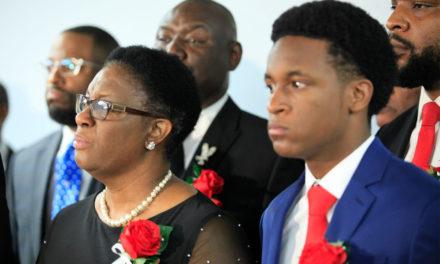
Last year, several studies came out showing that the 2016 election was still affecting relationships and families a year later. According to a new HuffPost/YouGov poll, about 40 percent of voters in last year’s election voted for a different candidate than at least one member of their family. Of that group, 40 percent said differing political views have been a problem in their family since the election. In another survey, a majority of millennials reported that it’s important that their partner shares their political views. It seems like an increasing number of us aren’t sure how to navigate political differences within our families, and even deeper than that, we seem to be dealing with a values rift among families that reflects the larger cultural rift and polarization.
How do we talk about the politics of inclusion with our families, including our chosen families, if this rift exists? Or do we? Is it worth the potential conflict or the potential pain of realizing that our people may fundamentally disagree with how we vote or what we care about? As with most things, it depends. It can feel incredibly vulnerable to share what we care about with the people closest to us because if they disagree, it can feel like they are disagreeing with who we are at our core. So, sometimes it may be worth it, but sometimes it may only lead to even more polarization. What are the discerning factors?
The goal of advocating for people in any setting is to educate people and share authentically from our own experiences in a way that pushes people to be more empathetic. It is not to necessarily to advocate for a particular candidate or a particular policy but to advocate for greater understanding around the broad range of human experiences. But familial bonds are deep and complicated. When we attempt this advocacy around the proverbial kitchen table, we must respect those dynamics, understanding that advocacy has its limits: psychological safety and shared meaning. If those two things don’t exist, it can be seemingly impossible to foster empathy and to harness our own capacity for empathy, even among family.
First, we have to feel safe enough to share our perspectives and know that our families and partners will continue to respect and love who we are and value where we are coming from, even if we have differences of opinion. Because the politics of inclusion are often deeply personal, this safety or lack thereof can determine whether or not a conversation around a certain topic is the right move.
For example, two years ago after the presidential election, I had a long conversation with my grandmother about what happened and how we move forward, and I ended up broaching a topic that perhaps wasn’t the right move and left me feeling unsafe.
My grandmother and I have entirely opposing views on almost everything, so this conversation was difficult to begin with, but I felt deeply committed to it because we have always been very close, and because I know her views reflect the views of many people in this country. I wanted to understand so that I could better advocate for my own perspective and experiences. Hint: she voted for Trump; I did not. But I really believed that we could find empathy for each other, as we always had, and that the conversation would leave us both more capable of engaging authentically in the midst of polarization. And perhaps it did… until it didn’t.
We went back and forth for two hours, and then, in a moment of frustration and exasperation, I brought up the many allegations of sexual assault against Trump, thinking that she must believe that behavior to be unacceptable. Instead, however, she brushed off my question, saying that those women are just looking for financial or political gain – they aren’t telling the truth. I was shocked, and I started to get defensive, asking, “But Grandma, given how we treat survivors of sexual assault, what could they possibly have to gain?” She didn’t really have an answer, but the conversation went downhill from there.
As a survivor of sexual assault, it was deeply painful to hear my grandmother discrediting other survivors, and questioning their motives in speaking up, just as mine had been questioned when I spoke up. And while I could have used that opportunity to combat her narrative of survivors with my own and hope that she could see truth in it, I no longer felt safe. I no longer felt that the experiences that shape my perspective would be valued. So, I walked away. And while I know that my grandmother respects and loves me, and I her, we do not have conversations like that anymore. To preserve our relationship, and to preserve the feeling of belonging that I have always enjoyed within my family, I have shied away from them ever since.
And I think that’s okay. We have to know our boundaries. We have to know that our experiences do not always have to be tools for dismantling other people’s ideologies and beliefs. They are ours to live with and ours to share.
That being said, this story also brings up an important point about shared meaning. In reflecting on that conversation afterwards, I realized that while we tried, we really struggled to find shared meaning throughout because we weren’t necessarily speaking authentically from our own experiences. For her part, my grandmother listens to a lot of right-wing political commentators, and when she talks about politics, she is often just repeating the talking points she hears. And when I hear those talking points, I wonder if she actually believes them. It seems entirely incongruent with the woman I know – generous, kind, steadfast, loyal and optimistic. When she speaks about politics, however, she often seems cynical, angry, petty, and stubborn.
And I, for my part, become defensive, frustrated, and desperate for any fact or story that will defeat her talking points. So, I often revert to my own, originating from my consumption of progressive news sources, forgetting why I came to the conversation in the first place.
In this process, we lose the humanity of the conversation. We lose authenticity. We lose heart. Our conversation may have been passionate, both of us feeling fully convicted, but it lacked the moments of shared understanding that would make that passion less futile, less angry.
What if we could’ve said, “I think we both want to build a world in which women are valued just as much as men” or “We both obviously deeply care about preserving people’s rights.” If we could’ve found common ground there, maybe we could’ve precluded some of the hurt, some of the talking points, and just shared from our own experiences and our own hopes.
Since then, I’ve learned and am still learning. And I’ve been able to have conversations with different family members about things we disagree on with more honesty and more empathy. I’ve learned that political talking points are a hard boundary. If I hear them, I try to call them out, or I see them as a signal that this conversation isn’t where I need to practice advocacy. In having conversations around such deeply meaningful topics with my family, I’d rather hear their own stories, their own experiences, their own analysis. And I use this boundary to hold myself accountable to my own authenticity.
Ultimately, finding common ground and preserving psychological safety while advocating for inclusion in families full of complicated dynamics, diverse opinions, and varied experiences is incredibly difficult. I certainly care more about what my grandmother thinks of me than the people who follow me on Twitter. These conversations are truly Bold, Inclusive Conversations®. They push us out of our comfort zones and force us to ask ourselves whether or not we are really ready to listen. They compel us to be honest, even if we have to walk away. But we can always come back if we we’re willing to be curious, not judgmental, and hopeful rather cynical.
Families are often our first battle ground as inclusion advocates. We may have exposure to a breadth of knowledge around diverse people and identities that our families don’t have, but we have to remember that our own knowledge and experiences and values started with them, and we have to acknowledge that common ground before moving forward.
Here are some tips for finding common ground, adapted from Mary-Frances Winters’ book, “We Can’t Talk About That at Work!: How to Talk About Race, Religion, Politics and Other Polarizing Topics.”
- Practice inclusive listening
- Focus on self-awareness (e.g. know how you feel about the topic and why)
- Describe before interpreting
- Choose curiosity over judgment
- Use “I” language instead of “you” language
- Pause and reflect often
- Ask clarifying questions
- Avoid debate
- Communicate your boundaries
- Be generous with your assumptions
- Remember self-care while leaning into discomfort


















